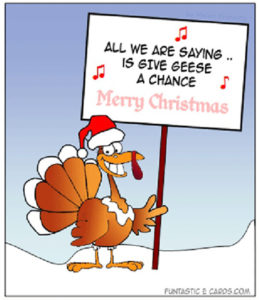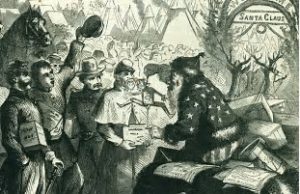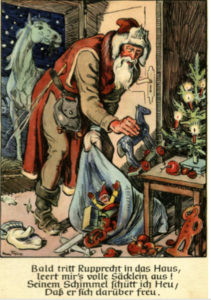If language is not correct, then what is said is not what is meant; if what is said is not what is meant, then what must be done remains undone; if this remains undone, morals and art will deteriorate; if justice goes astray, the people will stand about in helpless confusion. Hence there must be no arbitrariness in what is said. This matters above everything.
Christmas Turkey
The most widely-served Christmas entrée today is the turkey, Meleagris gallopavo, a bird first domesticated in Mexico by the Aztecs and exported to Europe in the sixteenth century by the Spanish. It derives its English name from confusion with the guinea fowl which was imported about the same time by merchants trading with Turkey. William Strickland, a Yorkshireman, introduced the bird into England and, in recognition, was granted a turkey cock on his family coat of arms in 1550. Before too long it was accepted as a seasonal dish: Thomas Tusser in 1573 speaks of it as “Christmas husbandlie fare” but for centuries the goose remained the primary Christmas bird. The bird was raised in great numbers on farms in Norfolk and East Anglia with huge flocks driven to market in London every Christmas — walking on the roads was difficult for the birds who were fitted with special shoes for the journey which could last as long as three months. It was not until the nineteenth century with the advent of rail travel and refrigeration that these drives ceased and were replaced by slaughtering on the farm. In 1851 the British royal family ate their first Christmas turkey which from that time on replaced swan as the seasonal dish.
Americans are the world’s greatest consumers of turkeys since the two great end-of-year festivals, Thanksgiving and Christmas, both feature the fowl whom Benjamin Franklin wanted to make the national bird of the United States — he deplored the bald eagle’s “bad moral character” and claimed the turkey was a “much more respectable bird, and withal a true original native of America.” Since 1947, the National Turkey Federation has presented the President of the United States with a live turkey and two dressed birds at Thanksgiving. The annual presentation signals the unofficial beginning of the “holiday season”; after the ceremony, the National Thanksgiving Turkey retires to a historical farm to spend its declining years in comfort.
The bird is eaten all around the world. In Portugal poultry farmers walk the streets of Lisbon with their their flocks. When a buyer has chosen the turkey he wants, the farmer catches the bird, forces alcohol into it, and briefly releases it. The inebriated turkey soon collapses; its throat is then slit; it is plucked and eviscerated, before being soaked in salt water, perfumed with lemon and bay leaves, for twelve hours. The bird is then hung for twelve hours before being cooked. The Brazilians have a similar love of turkey tenderized from within: they feed the bird a kind of rum called cachaça on Christmas Eve. In the southern United States the custom of deep-frying the bird is growing while in Mexico they eat the bird with a sauce made of chocolate and chili peppers. In Spain they stuff the bird with truffles; in Burgundy they stuff it with chestnuts. In 1969 the Apollo astronauts’ first meal on the moon was roast turkey.
According to Paul Valery
To enter into your own mind you need to be armed to the teeth.
Shooting In Christmas
In many parts of the world Christmas is associated with gunpowder: fireworks and firearms have been “shooting in” the holiday for centuries.
One reason for this is the belief that demonic forces can be driven away with loud noises. The ringing of bells, snapping of whips and shouting are all very well but for for real devil-dispersing noise many Germans rely on rifles. In southern Germany marksmen’s clubs in traditional costume gather on Christmas Eve to fire off antique rifles at midnight. In Berchtesgaden in the Bavarian Alps before midnight mass, 60,000 shots are fired in the space of one hour. In the southwestern United States the parishioners of the Church of San Geronimo at Taos Pueblo carry the statue of the Virgin in a procession accompanied by an honour guard of men in ceremonial dress who periodically fire into the air in order to protect the Virgin and chase away evil spirits. In rural areas of Norway shooting in Christmas takes the form of young men sneaking up to farm houses and discharging their guns to give the inhabitants a shock before being invited in for a drink. Every December 8 in Torrejoncillo, Caceres, Spain the youth of the town wrap themselves in sheets, carry the banner of the Virgin and ride through the streets shooting off shotguns to the cheers of the populace. In Ireland it was once the custom to fire a salute from a shotgun at noon on Christmas Eve
An account of Labrador in 1770 reads: “At sunset the people ushered in Christmas, according to the Newfoundland custom. In the first place, they built up a prodigious large fire in their house; all hands then assembled before the door, and one of them fired a gun, loaded with powder; afterwards, each of them drank a dram of rum; concluding the ceremony with three cheers. These formalities being performed with great solemnity, they retired into their house, got drunk as fast as they could, and spent the whole night in drinking, quarrelling, and fighting.” A similar Newfoundland custom was Blowing the Pudding.
Christmas in the southern United States is a more popular time for fireworks than July 4 as can be seen from the numerous displays south of the Mason-Dixon line. The most spectacular are probably in Louisiana where the feux de joie (fires of joy) are a traditional part of Cajun Christmas Eve. Huge wooden structures in the form of riverboats, houses and teepees are set on fire, ostensibly to light Papa Noël’s way to the bayous. During the days of slave-owning, slaves would inflate a pig bladder and then explode it in lieu of fire-crackers.
Fireworks are a part of Christmas celebrations all through Latin America but who would have thought they were once a part of the holiday in Switzerland? One worshipper complained in the nineteenth century about a church service where the Christmas tree was decorated with “serpent squibs” and where it was “difficult for the minister to conduct the service, for at all times, except during the prayers, the people were letting off fireworks.”
According to Aristotle
Wit is educated insolence.
Santa and the Confederacy
The American Civil War was conducted economically as well as on the battlefield. The Northern forces attempted to strangle the South by blockading its ports, denying it the wealth from its cotton exports and forbidding any imports. Poverty was the result for many families and they were unable to provide Christmas gifts for their children; the kids of the Confederacy naturally wondered why Santa Claus had ignored them.
One explanation was offered in a children’s book by Louise Clack, entitled General Lee and Santa Claus. Three little girls, Lutie, Birdie and Minnie (the latter still a hardened rebel because of the memory of her father who died fighting for the South) wonder at the absence of Santa Claus during the war years. They write to General Robert E. Lee as “the goodest man who ever lived” to ask him “whether Santa Claus loves the little rebel children, for we think that he don’t; because he has not come to see us for four Christmas Eves.” General Lee replies that he himself was responsible for Santa’s actions. One December 24, 1861, he says, he spied “the queerest, funniest-looking little old fellow riding along in a sleigh through the air” and bade him stop. He forbade Santa from heading south and told him: “Santa Claus, take every one of the toys you have back as far as Baltimore, sell them, and with the money you get buy medicines, bandages, ointments and delicacies for our sick and wounded men; do it and do it quickly — it will be all right with the children.” Santa replied: “I obey orders, General” and for four years he took the toy money and used it to clothe and feed Confederate soldiers.
According to Charlie Chaplin
What do you want a meaning for? Life is a desire, not a meaning.
Santa in the American Civil War
Though Christmas was celebrated almost universally in the United States in the 19th century, the notion of a magical gift-bringer was not so wide-spread. By the time that the Civil War broke out between North and South, Santa Claus had not completely penetrated all of the nooks and crannies of the American continent and he was a novelty to many of the troops on both sides. In a Union military hospital the approach of Christmas produced a wave of interest and excitement. A volunteer nurse noted:
Some of the boys had never heard of Santa Claus and his visits down the chimney at this merry season; and when his descent through the pipes, and passage through the stove-doors, and appearance in the tents became possibilities, there was as much amusement and anticipation among them as ever gladdened a nursery full of children. On the morning of this happy festival every man found a sock hanging by his side stuffed with mittens, scarfs, knives, suspenders, handkerchiefs, and many little things. Out of the top of each peeped a little flag; and as the men awoke, one by one, and examined the gifts of Santa Claus, shouts of merriment rang through the wards, and they were satisfied that he was a friend worth having.”
According to Theodore Roosevelt
To educate a man in mind and not in morals is to educate a menace to society.
Knecht Ruprecht
A Gift-Bringer’s Helper who first appeared in a 1668 German play and was condemned as a manifestation of the devil by the Catholic church in 1680. Knecht Ruprecht is the intimidating figure, dressed like a dark-bearded monk, with a long dark coat of animal skins and a filthy beard that reaches the floor, carrying a switch. He quizzes children as to their behaviour. He is sometimes identified with Belsnickel or Pelznickel (“Nicholas in Furs”) and Ru-Klas (“Rough Nicholas”) indicating that he was originally not just a companion to St Nicholas but a darker version of him.
The English poet Thomas Coleridge visited north Germany in the early nineteenth century and witnessed local Christmas ceremonies. He mentioned that it was the custom in smaller centres of north Germany for presents to be given by Knecht Ruprecht “in high buskins, a white robe, a mask, and an enormous flax wig…On Christmas-night he goes round to every house, and says that Jesus Christ, his master, sent him hither. The parents and elder children receive him with great pomp and reverence while the little ones are most terribly frightened. He then inquires for the children , and, according to the character which he hears from the parents, he gives them the intended present as if they came out of heaven from Jesus Christ. Or, if they should have been bad children, he gives the parents a rod and, in the name of his master, recommends them to use it frequently. About seven or eight years old the children are let into the secret, and it is curious how faithfully they keep it.”
Under the Nazi regime, the German government tried to replace Santa Claus and St Nicholas with their version of Knecht Ruprecht, pictured above.




